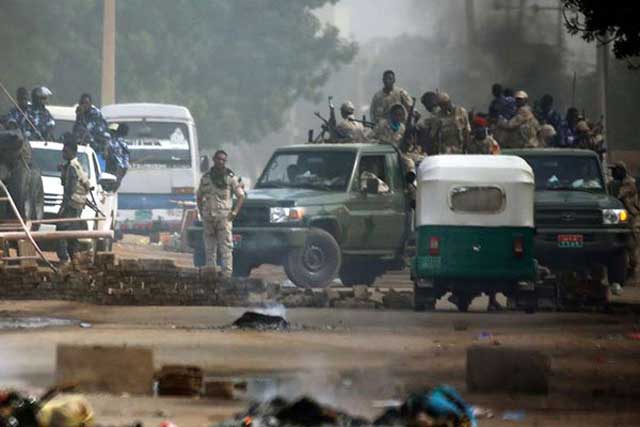
Khartoum, Sudan | AFP | Heavily armed paramilitaries roamed the Sudanese capital Thursday, forcing fearful residents to hide indoors after a crackdown on protesters that authorities admitted had left dozens dead and prompted the African Union to suspend Khartoum.
Members of the Rapid Support Forces, who rights groups say have their origins in the Janjaweed militias of Darfur, deployed on the streets in pick-up trucks mounted with machine guns and rocket launchers, witnesses said.
“We’re living in a state of terror because of sporadic gunfire,” a resident of south Khartoum told AFP.
He said he was “afraid for (his) children to go out in the street”.
As international condemnation mounted, a health ministry official told AFP that “the death toll across the country had risen to 61,” including 52 killed by “live ammunition” in Khartoum.
But it denied doctors’ claims that more than 100 people had been killed in the crackdown on protesters that began with a raid on a long-running sit-in outside the army headquarters on Monday.
The Central Committee for Sudanese Doctors said Wednesday that 40 bodies had been pulled from the Nile, sending the death toll soaring to at least 108.
The committee, which is part of the protest movement and relies on medics on the ground for its information, warned the figure could rise.
The military ousted longtime president Omar al-Bashir in April after months of protests against his authoritarian rule, but thousands of demonstrators had remained camped out in front of the army headquarters calling for the generals to cede power to civilians.
Despite several initial breakthroughs, talks between the ruling military council that took power after Bashir’s ouster and protest leaders collapsed over who should head a new governing body.
– ‘Feeling of terror’ –
Some life had returned to the streets of the capital on Thursday, with limited public transport operating and only a few cars on the roads.
A small number of shops and restaurants were open on the second day of the Eid al-Fitr holiday.
But in Omdurman, just across the Nile from Khartoum, a resident said there was a “feeling of terror” about “many military vehicles with all these weapons”.
“We hope that this situation will end quickly so normal life resumes,” he told AFP.
At Khartoum’s airport, relatives of travellers stayed late into the night waiting to see if their flights would arrive, following a slew of cancellations over the past few days.
Internet blackouts continued to beset the city.
The African Union suspended Sudan, “until the effective establishment of a civilian-led Transitional Authority, as the only way to allow the Sudan to exit from the current crisis”, it said on Twitter.
The AU had urged the ruling generals to ensure a smooth transition of power, but the brutal crackdown to disperse protesters saw pressure mount on it to bring those responsible for the violence to justice.
The European Union said it joined the AU in calling for “an immediate end to violence and a credible enquiry into the criminal events of the last days”.
France called for the “resumption of dialogue” between the military committee and the opposition so that an “inclusive agreement is quickly found”.
– ‘Extreme caution’ –
The United Nations and the British embassy announced they were pulling non-essential staff and their families from Sudan, and the United States warned its citizens to exercise “extreme caution” amid the ongoing uncertainty.
Despite the heavy presence of security forces on Khartoum’s main streets, the groups that spearheaded the demonstrations against Bashir made a fresh call on Thursday for civil disobedience.
“The revolution continues and our people are victorious despite the terrorism and violence of the militias,” the Sudanese Professionals Association, the group that initially launched the anti-Bashir campaign, posted on Twitter.
It urged an “indefinite strike and civil disobedience,” warning against calls for violence.
In the northern suburb of Bahri, smaller roads were blocked by protesters putting up makeshift barricades made from rocks, bricks and tree trunks.
The protesters blamed the bloody crackdown on the “militias” of the military council.
The Rapid Support Forces have been singled out by protesters.
Some residents seemed wary of the heavy deployment of paramilitaries in the streets of the capital.
RSF commander Mohamed Hamdan Dagalo, widely known as “Himediti,” said he was on the side of the “revolutionaries”, but warned he would not “allow chaos,” referring specifically to the barricades put up in some neighbourhoods.
The ruling Military Council issued a statement hitting out at the “campaign organised on social media aimed at spreading lies and fabricating accusations”.
It said the RSF “refused to carry out the orders of the former regime to expel demonstrators from the sit-in by force”
 The Independent Uganda: You get the Truth we Pay the Price
The Independent Uganda: You get the Truth we Pay the Price



